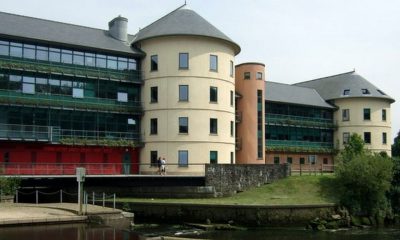News
Car insurance ‘shock’ as premiums rise 40%

A STARTLING surge in car insurance premiums has left British motorists reeling, as the average cost of coverage now stands at a staggering £776 – an alarming 40% increase over the past 12 months alone. This unsettling revelation comes to light following the latest car insurance price index for Q2 2023, powered by WTW, which analysed over 6 million quotes.
These astronomical price hikes have catapulted car insurance into the ranks of the three most expensive household bills, trailing only behind council tax and energy expenses. For the average UK driver, council tax sets them back £984 annually, while energy costs come close at £964, further burdening household budgets.
Nevertheless, amidst this financial turmoil, there remains a glimmer of hope for drivers seeking solace. Surprisingly, some individuals have managed to save money by diligently comparing and switching insurance providers. Research conducted by Confused.com reveals that motorists who shopped around and switched insurers in the past three months saved an average of £63. Regrettably, only a mere 9% reported receiving a cheaper renewal price compared to the previous year.
The experts at Confused.com attribute these escalating prices to a surge in claims and the consequential rise in the cost of processing such claims. The resulting unprecedented increase in car insurance costs can be largely attributed to this surge in claims.
To mitigate the financial burden faced by drivers, Confused.com has issued valuable advice on how to reduce car insurance costs. Additionally, the survey highlights that 40% of Brits are calling on insurers to play a more active role in keeping prices at a manageable level.
Delving further into the data, male drivers are experiencing even more pronounced price hikes, with the average premium now standing at £827. This reflects a substantial 40% increase over the past year and an 18% increase over the last quarter. In comparison, female drivers are paying £690 on average, marking a 40% increase year-on-year and an 18% increase over the quarter. This discrepancy places the average gap between genders at £137.
Location plays a critical role in determining insurance costs, with some drivers now facing premiums over £1,000. Outer London witnessed a substantial 42% increase in prices, resulting in an average premium of £1,003 – the first time it has surpassed the £1,000 mark since the index’s inception. Inner London remains the most expensive region in the UK, with the average driver paying a hefty £1,257.
Unsurprisingly, car insurance prices have risen across all regions, though some areas still experience considerably lower costs. The South West boasts the most affordable average insurance cost, reaching only £509, despite a 36% increase over the past year.
Moreover, age plays a pivotal role in determining the financial burden on drivers. Younger drivers, aged between 17 and 19, face the brunt of these price hikes, paying more than £2,000 for their policies on average. Among this group, 18-year-olds bear the highest costs, with an average premium of £2,404. In contrast, drivers around retirement age enjoy the most favourable prices, with 69-year-olds paying an average premium of just £413.
These variations in pricing can be justified by assessing the risk profile of different demographics. Factors such as claims frequency, location, and age all contribute to the variation in insurance costs. For instance, male drivers typically face higher risk profiles due to driving more miles and owning more expensive cars. Consequently, they are exposed to a higher risk of claims, leading to higher premiums.
To ease the financial strain on motorists, Confused.com offers several ways to potentially reduce insurance costs without altering driving habits significantly:
Accurate Mileage: Driving fewer miles can lead to savings on car insurance, as higher mileage often translates to increased accident risk and claim likelihood.
Voluntary Excess: Increasing the voluntary excess can result in cheaper insurance, although it is essential to ensure affordability in the event of a claim.
Annual Payments: Paying for insurance annually rather than monthly can be a cost-saving measure, as insurers typically charge interest for spreading costs throughout the year.
Enhanced Car Security: Improving vehicle security can lead to reduced premiums. Installing Thatcham-approved car alarms, immobilisers, and using secondary security measures like steering locks all contribute to lower insurance costs.
Amidst this challenging financial climate, Confused.com’s motor expert, Louise Thomas, emphasises the importance of shopping around for the best insurance deal. The competitive industry offers the potential for substantial savings, making switching a wise move for cost-conscious drivers. To incentivise this, Confused.com guarantees to beat renewal quotes or compensate customers with the difference plus an additional £20, providing drivers with peace of mind and financial relief.
Crime
Man charged with attempted murder after Carmarthen park incident

57-year-old due in court following alleged knife and stalking offences
A MAN has been charged with attempted murder following a serious incident in Carmarthen town centre last week.
Dyfed-Powys Police confirmed that James McKenna, aged 57, from Carmarthen, has been charged with attempted murder, possession of a bladed article in a public place, and stalking.
The charges relate to an incident in Carmarthen Park on Thursday (Jan 29), which prompted a significant emergency services response and caused concern among residents.
Police have not yet released full details of the circumstances, but officers were seen in and around the park area for several hours following the incident while enquiries were carried out.
McKenna is due to appear before Llanelli Magistrates Court on Thursday (Feb 5).
The Herald understands the case involves allegations of both violence and targeted behaviour towards an individual, with stalking listed among the charges.
Public concern
Carmarthen Park is a popular and busy public space used daily by families, dog walkers and joggers, and incidents of this severity are rare.
The news has prompted concern locally, particularly as the alleged offences include possession of a knife in a public place.
Residents have previously raised questions about safety in parks and open spaces across west Wales, especially during darker winter evenings.
Court proceedings
At this stage, the charges remain allegations and the case will now proceed through the courts.
Magistrates will decide whether the case is sent to Crown Court due to the seriousness of the attempted murder charge.
Further details are expected to emerge during Thursday’s hearing.
The Herald will be attending court and will provide updates as they become available.
Crime
Sex offender jailed after living off grid in Pembrokeshire and refusing to register

Man walked into police station after months avoiding authorities
A CONVICTED sex offender who told police he intended to live “off grid” rather than comply with legal monitoring rules has been jailed after handing himself in at a Pembrokeshire police station.

Christopher Spelman, aged 66, of no fixed address, appeared for sentence at Swansea Crown Court after admitting breaching the notification requirements of the sex offenders register.
The court heard Spelman was released from prison in Dorset on July 4 last year but immediately refused to provide police with an address, despite being legally required to do so within three days.
Instead, he indicated he planned to buy a tent and live outdoors.
Prosecutor Brian Simpson said officers subsequently launched a nationwide search when Spelman failed to make contact with police. Public appeals were issued and his case featured on the television programme Crimewatch.
Detectives believed he had been travelling around the UK using public transport and staying at campsites. He was known to have links to several areas including Merseyside, Manchester, Devon, Cornwall and Hampshire.
His whereabouts remained unknown until January 3 this year, when he walked into Haverfordwest police station and was arrested. It is unclear how long he had been in Pembrokeshire.
Spelman previously served seven years in prison after being convicted in 2014 of 12 counts of sexually assaulting a girl under the age of 14. He was placed on the sex offenders register for life.
The court heard this was not the first time he had failed to comply with the rules. After an earlier release in 2016, he again failed to register his address and avoided police for around five years before being caught.
He has 11 previous convictions for 29 offences.
Defence barrister Andrew Evans described the case as unusual and said his client had long disputed his original conviction and had expressed a wish to live “outside society”.
However, he said Spelman had gradually accepted that he remained subject to court orders and now wanted more stable accommodation and a chance to rebuild his life. The defendant asked the court to impose a custodial sentence so arrangements could be made for his future release.
Judge Geraint Walters noted there were signs Spelman wished to change but warned that any further breaches would result in longer prison terms.
With credit for his guilty plea, Spelman was sentenced to 10 months in prison. He will serve up to half in custody before being released on licence.
Crime
Former Wales rugby star admits Christmas Day drink-driving offence

Ex-Ospreys captain was almost twice over limit in Pembroke town centre
Former Wales back row Jonathan Thomas has admitted driving through Pembroke town centre on Christmas Day when he was almost twice over the drink-drive limit.
This week Haverfordwest magistrates heard that Thomas, 43, was stopped by officers as he drove his Mercedes CLA 220 along The Green, Pembroke, at around 5pm on Christmas Day.
“The officers were very concerned at the manner of his driving, as the car was being driven erratically and was swerving to the other side of the road,” said Crown Prosecutor Sian Vaughan.
“When Jonathan Thomas got out of the car, the officers could see that he was having difficulty standing and was unsteady on his feet.”
Subsequent breathalyser tests showed Thomas had 62 mcg of alcohol in his system, the legal limit being 35.
Thomas, who has no previous convictions, pleaded guilty to the drink-drive charge and was represented in court by solicitor Jess Hill.
“He has family in the area and had travelled to spend time with them on Christmas Day,” she told the magistrates. “He’s very remorseful for his actions and hugely regrets his decision that day.”
Jess Hill concluded by saying that Thomas is currently “between jobs and living off his savings”.
Thomas, who gave his address as Main Road, Bredon, was disqualified from driving for a total of 18 months.
“The length of your disqualification reflects the fact that you were more than a little bit over the limit,” commented the presiding magistrates when imposing sentence.
He was fined £120 and ordered to pay £85 costs and a £48 court surcharge.
The former Wales back row left his role as Swansea RFC head coach at the beginning of December 2025 as a result of ongoing health concerns. He was forced to retire from playing in 2015 on medical advice after being diagnosed with epilepsy and is one of the 390 former rugby union players currently taking part in a concussion lawsuit against the sport’s authorities.
“Long-standing issues linked to the head trauma have caused me some concern recently and it has been impossible for me to give the role everything it needs,” he said in a previous interview with the BBC.
His rugby career started out with Pembroke RFC juniors before moving to Swansea RFC, which he captained when he was 19. He then joined the Ospreys where, over a ten-year period, he won four league titles and an Anglo-Welsh Cup. He was the youngest player to captain the Ospreys and, at the time of leaving, was the joint highest appearance holder, together with Andrew Bishop, on 188 appearances.
His international career saw him play for Wales at Under-16, Youth, Under-19, Under-21 and Sevens levels. He made his senior international debut against Australia in 2003, featured at the 2007 Rugby World Cup and was part of two Six Nations Grand Slam-winning sides in 2005 and 2008. Between 2004 and 2011, Thomas was included in every Wales Six Nations squad. In his appearances for Wales, he scored seven tries.
-

 Health7 days ago
Health7 days agoConsultation reveals lack of public trust in health board
-

 Crime14 hours ago
Crime14 hours agoSex offender jailed after living off grid in Pembrokeshire and refusing to register
-

 News2 days ago
News2 days agoPrincess of Wales visits historic Pembrokeshire woollen mill
-

 Crime6 days ago
Crime6 days agoPembroke man accused of child sex offences sent to Swansea Crown Court
-

 Health4 days ago
Health4 days agoDoctor struck off after sexual misconduct findings at Withybush Hospital
-

 Crime2 days ago
Crime2 days agoHakin man’s appeal delayed again as Crown Court seeks guidance on insurance law
-

 Community6 days ago
Community6 days ago50s women threaten legal action over pension compensation refusal
-

 Business7 days ago
Business7 days agoEight-year prison sentence after vehicle stop uncovers drugs worth over £150,000



































